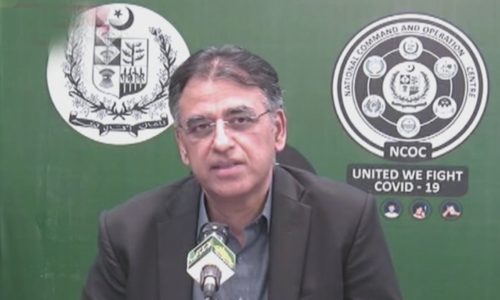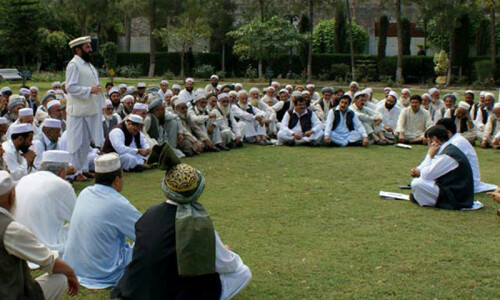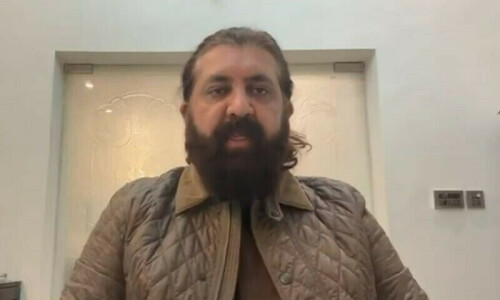Prime Minister Imran Khan on Saturday said that if levels of poverty in Pakistan increased by the time it has defeated the coronavirus, the country will have lost the overall war.
"Our greatest challenge is to ensure that those suffering from economic distress right now do not fall further below the poverty line. Because if they do and our poverty rises by the time we have defeated this virus, we will have lost the war," the premier remarked at a press briefing alongside ministers and his special assistants.
He said that while the number of confirmed coronavirus cases in Pakistan is currently lower than projected, the country could still face "difficulties" from May 15. He advised people to be careful going forward.
"Our initial projections showed that we would have 50,000 cases by April 25. By Allah's grace, that's not the case. Our new projections suggest that we could now have 12,000 to 15,000 coronavirus patients by next week. In other words, the pressure we expected in our hospitals earlier would now be felt next month," he warned.
Prime Minister Imran added that the government is currently in the process of procuring ventilators and personal protective equipment to prepare for the potential spike in cases and deaths next month.
He credited the country's lower number of confirmed Covid-19 cases than previously projected to timely actions by the government.
"We acted promptly in March when we only had a few cases. Sindh enforced a stricter lockdown, we quarantined pilgrims from Iran at Taftan border and we screened passengers at the airport. So you see, we're now reaping benefits of quick decision making."
He added that the government will now "gradually start reopening the economy, starting from the construction sector".
Explaining his decision to prioritise the reopening of the construction sector, Imran said that his government "opted to reopen the construction industry because this industry provides countless jobs to our people".
The prime minister also requested the police forces of the country to be gentle with people while enforcing lockdown measures.
"Be gentle, I understand that there's a lot of pressure on you (police). But we can't enforce a lockdown if we're strict with our people. If people do not get rations, there is no way they will not come out on the streets and our efforts to control the virus will fail. Harsh measures are unlikely to work," he cautioned.
The premier also announced that the government will soon issue an ordinance to crack down on smuggling. He issued a warning to hoarders once again, saying the government will take strict action against them. "We will go directly after owners of stores that are hoarding items. We will be extremely harsh with you," he warned.
Prime Minister Imran also urged his countrymen to follow the directives issued by President Dr Arif Alvi regarding Ramazan.
"Today Dr Alvi met ulema and issued directives for the holy month of Ramazan. Please follow these directives because following them is in your interest," he advised.
PM Imran rubbishes reports of government hiding casualties
The prime minister also questioned the spread of "fake news" regarding a higher number of Covid-19 deaths than officially reported in Sindh, calling the news "irresponsible". He rejected the "baseless" reports and questioned the idea that a government would ever hide casualties of its own people.
Dr Faisal Sultan, the prime minister's focal person on coronavirus, added that the government was investigating suspected deaths due to Covid-19 in Karachi. "Some 15 of the 300 deaths that were reported in Karachi are suspected to be due to coronavirus. But we are still investigating the matter and will not issue any further comment on it," he said.
Federal Minister for Industries Hammad Azhar, meanwhile, announced that the government will introduce a scheme for payment of electricity bills on instalments, saying that this facility will primarily benefit small businesses and shop owners.
Azhar said the government will bring forth an "economic programme for those who have lost their jobs" amid lockdowns enforced to contain the spread of the coronavirus.
The minister revealed that there were 10 per cent more stocks of food items in utility stores across the country as compared to Ramazan of last year.
In his remarks, Minister for Planning, Development and Special Initiatives Asad Umar warned that even though the country's case numbers are currently lower than previously projected, the situation is still "uncertain".
He said this was why testing, tracing and quarantining was necessary. "We need to increase our testing capacity at once. Our aim is to conduct 25,000 tests daily by the month's end."
Explaining what testing, tracing and quarantining would entail, Umar said that the government would first aim to conduct mass testing followed by constituting a system of extensive contact tracing whereby infected patients and all those who came in contact with them are quarantined.
Special Assistant to the Prime Minister on National Security Dr Moeed Yusuf, meanwhile, thanked overseas Pakistanis for their "patience", assuring them that the government is making arrangements to repatriate them soon.
"We are trying to increase our quarantine and testing facilities so that we can bring [overseas Pakistanis] back as soon as possible. Our target is to be able to bring back up to 7,500 people every week," he revealed.
He added that the government will also grant permission to commercial airlines to bring back Pakistanis stranded abroad.
"Some of our students whose visas have expired in the US, Malaysia and Australia have been granted permission to return via commercial airlines. Rest assured we will follow our usual protocol of testing and quarantining every individual who is returning from abroad," Yusuf concluded.














































